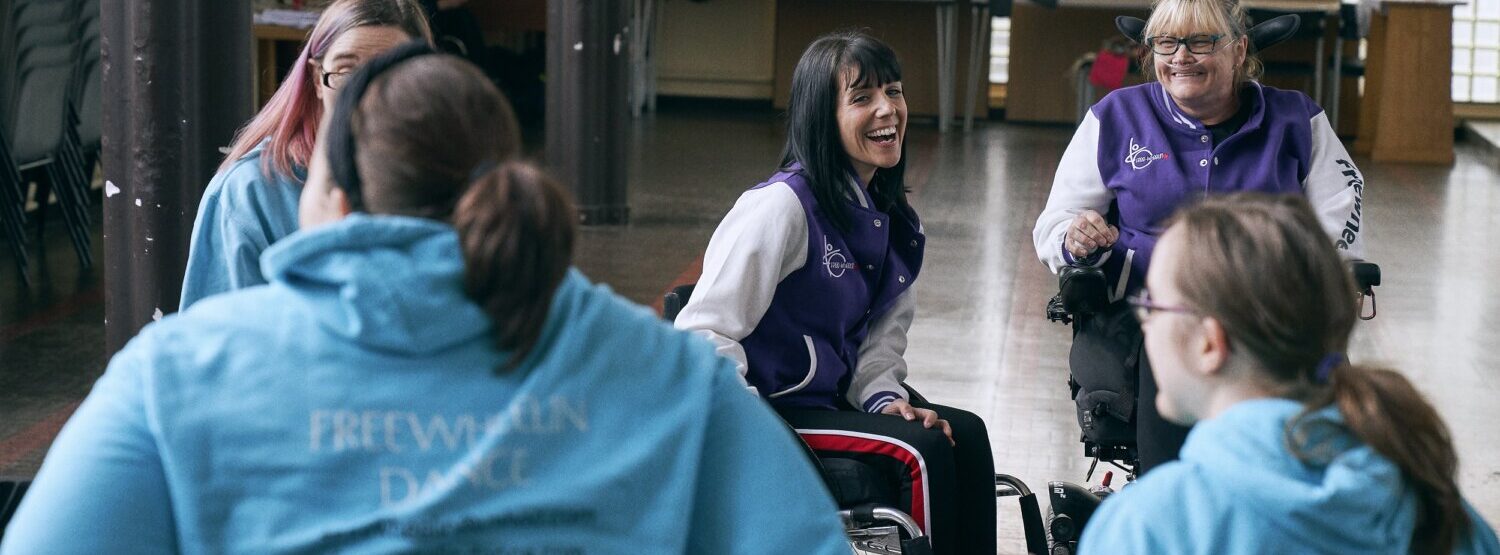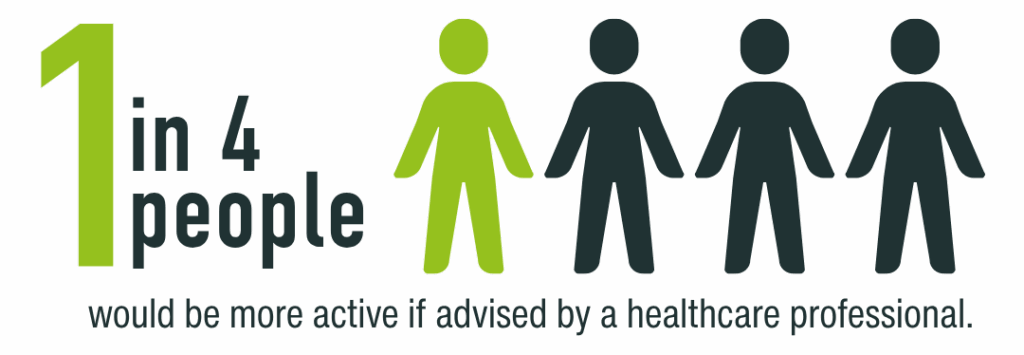

One person dies of physical inactivity every 15 minutes. Health professionals can empower people to move more with a 1-minute conversation.
Health care professionals (HCPs) play a vital role in encouraging patients to be more active. As trusted voices, HCPs are well-placed to have effective, brief conversations that can significantly increase patients’ motivation and likelihood to become more active. Evidence shows that even short discussions about physical activity during routine appointments can lead to meaningful behaviour change, improving health outcomes and reducing long-term pressures on health services.
There is no situation, there is no age and no condition where exercise is not a good thing.
Chris Whitty, England's Chief Medical Officer
Nearly three quarters of GPs say they don’t feel equipped with the knowledge, skills, or confidence to talk to patients about physical activity. While recommendations will vary depending on the individual, the key takeaway is clear: doing some activity is always better than doing none. Even small steps can make a big difference to a patient’s health.

Below you’ll find resources and training to help empower you to include physical activity conversations in patient care.
The Chief Medical Officer recommends that all adults over the age of 19 should:
150 minutes of moderate intensity activity also applies to disabled people and pregnant women.
View the Department of Health and Social Care infographic for adults and older adults.
Alternatively, you can read the full Chief Medical Officers’ Physical Activity Guidelines report.
The Chief Medical Officer recommends that disabled adults should do at least 150 minutes of moderate-intensity activities per week, or 75 minutes of vigorous-intensity.
Additionally, it is suggested that disabled adults should do strength and balance activities on at least 2 days per week.
View the Department of Health and Social Care infographic for disabled adults.
Alternatively, you can read the full Chief Medical Officers’ Physical Activity Guidelines report.
The Chief Medical Officer recommends that disabled adults should do at least 150 minutes of moderate-intensity activities per week.
View the Department of Health and Social Care infographic for pregnant women.
View the Department of Health and Social Care infographic for women after childbirth.
Alternatively, you can read the full Chief Medical Officers’ Physical Activity Guidelines report.
The Chief Medical Officer recommends that all children aged 0-5 years should aim for 180 minutes of movement per day.
For children aged 1 year and under, this should include at least 30 minutes of tummy time across the day.
View the Department of Health and Social Care infographic for children aged 0-5 years.
Alternatively, you can read the full Chief Medical Officers’ Physical Activity Guidelines report.
The Chief Medical Officer recommends that all children and young people aged 5-18 years should aim for an average of at least 60 minutes of movement per day across the week. This can be broken up into 30 minutes at home and 30 minutes during the school day.
View the Department of Health and Social Care infographic for children and young people aged 5-18 years.
Alternatively, you can read the full Chief Medical Officers’ Physical Activity Guidelines report.
The Chief Medical Officer recommends that disabled children and young people should be getting 20 minutes of exercise a day and doing strength and balance activities three times a week.
View the Department of Health and Social Care infographic for disabled children and young people.
Alternatively, you can read the full Chief Medical Officers’ Physical Activity Guidelines report.
Hop over to the National Institute for Health and Care Excellence (NICE) guidance for more detail.
NICE also publishes the latest pathways and quality standards.
Alternatively, you can read the full Chief Medical Officers’ Physical Activity Guidelines report.
The Physical Activity Clinical Champions (PACC) programme provides free, peer-to-peer training—both online and in person—for healthcare professionals. It’s designed to boost knowledge, skills, and confidence, helping clinicians effectively weave physical activity into everyday patient care.
In Hampshire and the Isle of Wight, this important work is being led by Rebecca Gould, a Physical Activity Clinical Champion within the Integrated Care Board. Rebecca is working closely with the health sector to understand the needs of professional in Hampshire and the Isle of Wight. The sessions will tailored to strengthen their understanding and embed physical activity into routine practice—ensuring every patient interaction is an opportunity to support better health through movement.
Over 55,000 HCPs have been trained across England so far. People that have attended have experience improvements in their knowledge, confidence and frequency of patient physical activity conversations:
• 84% agreed the training was useful in their work
• 91% would recommend the training to their colleagues
• 40% of HCPs were having more conversations with their patients about physical activity post-training
If you’re interested in training please get in touch with Rebecca, rebecca.gould11@nhs.net
Would it be OK to spend 1 minute talking about something many patients with [your condition] find really helpful?
Moving Medicine conversation starter
We know health professionals are often short on time, and people don’t always know they can be active. But a quick conversation framed in the right way can have a huge impact on a patient’s health.
Moving Medicine is the ultimate online tool to help health professionals champion active lives. The website contains step-by-step guides, online courses and videos to help you get started. Whether you have 1 minute or 5 your conversation can have real impact.
Find everything you need to have 1-minute, 5-minute and longer conversations with impact. Choose an age group and health condition to get started.
Visit siteCondition specific guidance for your patients to take away.
Visit sitePhysical activity is safe, even for people living with symptoms of multiple long-term conditions. Regular physical activity, in combination with standard medical care, has an important role in the management and prevention of many long-term conditions.
Visit siteWe’ve collated some of the best, recognised training to help health professionals build their confidence when it comes to talking about physical activity with their patients.
By using known sources like the British Medical Journal, NHS England and Public Health England you can trust in the advice, guidance and training they offer.
The NHS England Aquatic Activity and Swimming for Health e-learn is a free 30 minute guide for healthcare professionals and volunteers in various settings, explaining when and how to promote aquatic activity as means to being more physically active.
Access the e-learnning on the ELFH Hub
PHE and NHS’s Making Every Contact Count (MECC) course is a short interactive e-learning that looks at how we can use our everyday interactions to support behaviour change, without adding to busy workloads, and focuses on asking open questions and reflective listening.
Access via Health Education England’s learning portal (no registration needed).
Local events can also be found via Yellow Brick Road on Eventbrite
BMJ and PHE’s Motivational Interviewing course is a short one-hour module explaining what motivational interviewing is, its uses and explanations.
Access via BMJ learning (registration needed)
The Moving Social Work programme aims to create resources and co-produce strategies for the education of the social workers of today and tomorrow.
